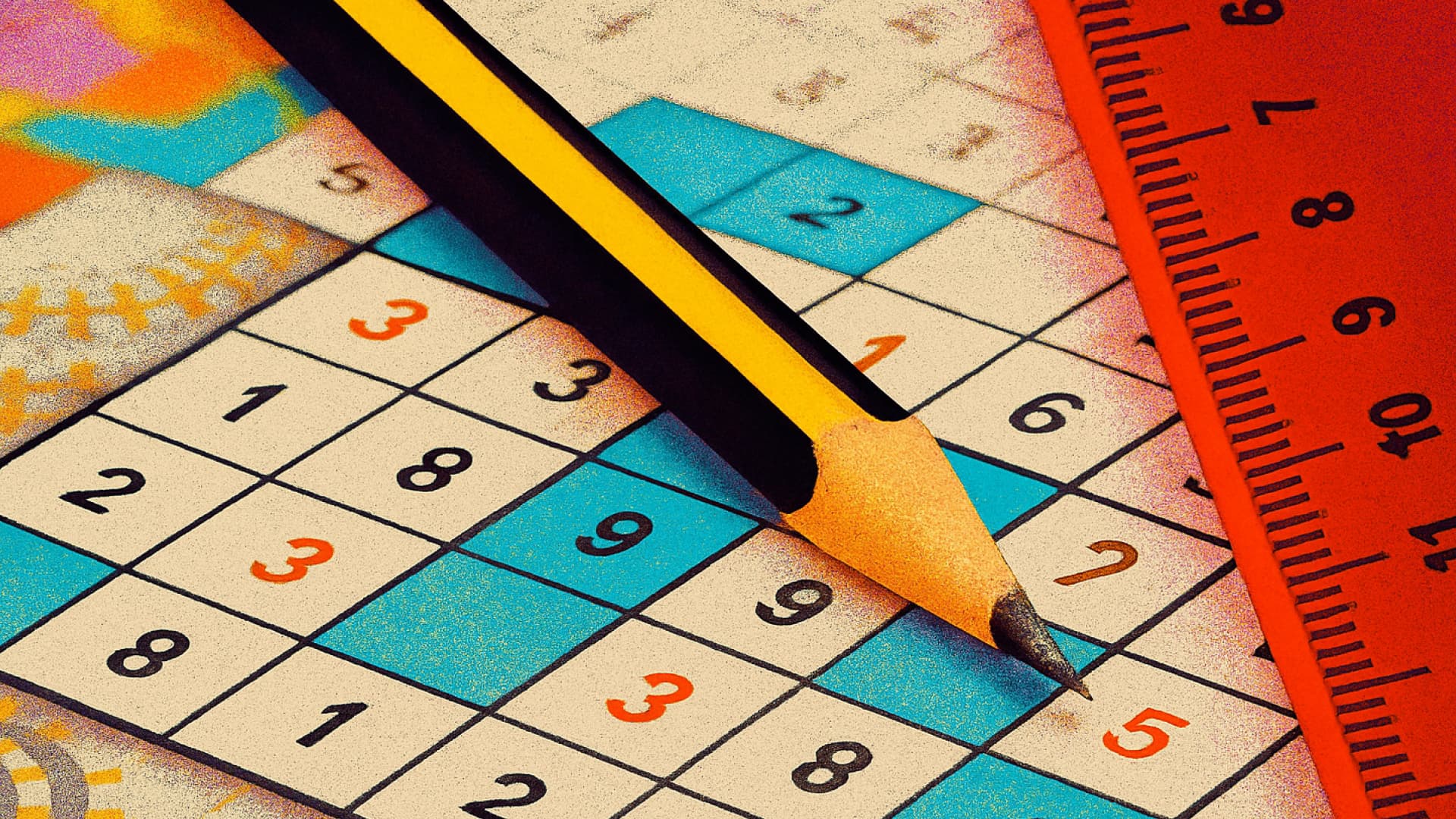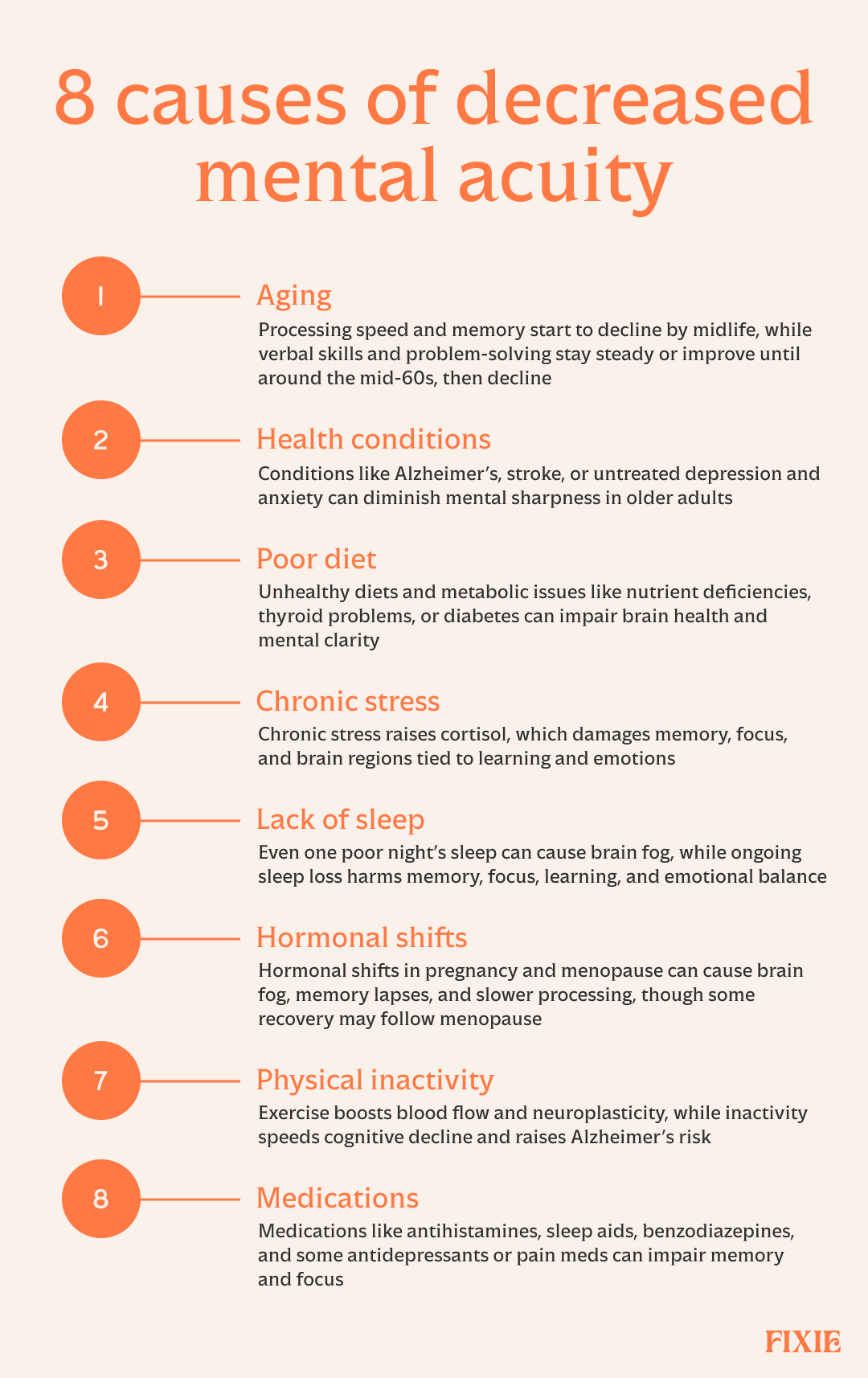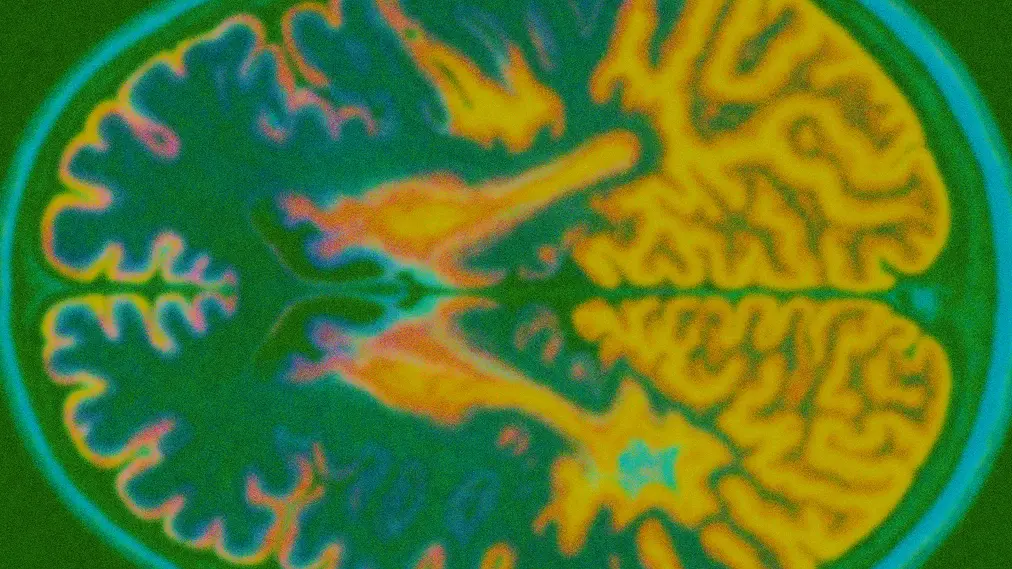What is Mental Acuity?

Feeling less sharp as we age is normal, but there are steps you can take to help prevent brain drain and keep firing on all cylinders. Read on to learn what is mental acuity and how to maintain it over time.
Some days, we wake up feeling whip-smart and check off the to-do list like it’s nothing. But as we age, those days can seem few and far between. We’re losing our train of thought mid-story. We’re forgetting to buy almond milk—not once but twice in one week (despite it being on the list both times). Is it just stress? Age? Mental overload? Or are our brains actually getting duller?
Mental acuity is a broad term referring to the sharpness and clarity of a person's mind, explains clinical health psychologist and a clinical assistant professor Hannah Holmes, Ph.D.
“As a psychologist, I'd refer to this as ‘cognitive functioning,’ which includes cognitive abilities such as processing speed, working memory, verbal reasoning abilities, and the ability to detect patterns and manipulate objects mentally,” she says. Mental manipulation of objects means doing thinking gymnastics: you can reshape things in your mind and visualize the result, all in your head.
A shift in our sharpness can occur with age or stress, but it’s not necessarily inevitable. In fact, with the right lifestyle habits and daily practices, you can maintain and—dare we say it—even improve your cognitive acuity.
What is mental acuity?
Mental acuity is your brain’s ability to think clearly and function efficiently. It’s a combo of cognitive functions, including:
- Focus and attention
- Memory (short- and long-term)
- Processing speed
- Judgment and decision-making

Think of it as how in-shape your brain is. Is that noodle a mental gym rat or a couch potato?. When mental acuity is high, you feel alert, quick-witted, and capable of doing all the things.. Decreased mental acuity might feel like you’re struggling to follow conversations, spacing out ontasks, or just generally feeling like your brain is full of cobwebs.
What affects mental acuity?
Your brain is influenced by lots of physical and emotional factors—diet, stress, sleep, you name it. While some cognitive changes are part of aging, many aspects of mental acuity are within your control.
Collectively, key brain functions determine how sharp someone’s mind is. “These abilities are distinct, yet intertwined,” Holmes says.
Processing speed
Some computers and smartphones are faster at processing information than others. Your brain has a processing speed, too.
“Processing speed refers to how quickly a person can take in information, make sense of it, and respond,” Holmes says. This includes when you’re reading a book, watching a movie, troubleshooting a work project, or following IKEA instructions (ok, maybe that last one doesn’t count).
Memory
Short-term memory and working memory are terms that are often used interchangeably, but they’re not identical. Short-term memory refers to the storage space that retains words, ideas, images, and other information for a short amount of time. And the time is less than you may think: about 15 to 30 seconds. Working memory refers to both the storage and the use of the information.
“Working memory is your brain's ability to hold onto information for a short time while you do something with it,” Holmes says. “For example, remembering a phone number long enough to dial it.”
If short-term memory is a one-car garage, long-term memory is a warehouse. Long-term memory is what allows us to recall people’s birthdays every year, facts we learned in social studies class in middle school, and what the old seaside diner your family went to on summer vacations looked and smelled like.
Long-term memory is split into two types: procedural and declarative. Procedural memory refers to remembering how to perform certain tasks many years after we learn them, like swimming, driving, or riding a bike. Declarative memories are either semantic (remembering what words mean, for instance) and episodic (remembering certain moments from our past, like a first kiss or graduation day).

Attention
Attention is actually a two-pronged concept. How attentive we are refers to how focused we are, but it also refers to our ability to filter out distractions. Attention is crucial for being productive at work, being present with our kids, driving safely, and having meaningful conversations with people.
Attention and working memory are very closely linked, researchers have found. This makes sense. We remember what we pay attention to, what we focus on. Attention filters out what stays in the memory and what’s discarded.
Judgment
We’ve all made smart, responsible choices, like passing on the third glass of wine at dinner. And maaayyyybe we’ve also made some poor decisions (ahem, college). Believe it or not, our judgment (or lack thereof) is actually tied to our mental acuity.
Mental sharpness and processing speed help us make decisions quickly. Plus, these judgments are often informed by memory and our ability to reason.
What causes decreased mental acuity?
Don’t panic: a dip in cognitive performance doesn’t always mean something is seriously wrong. Often, it’s the result of tweakable lifestyle factors, like poor sleep or elevated stress.
Here are some of the factors that make our brains feel less sharp.
Aging
Generally speaking, cognitive abilities peak in early adulthood. Processing speed and memory begin to show signs of decline as early as midlife, and continue to decline as the years march on. (Ugh.) Verbal abilities and problem-solving tend to remain stable or even improve into mid-adulthood, and then decline from the mid-60s onward.
A study from 2016 published in the journal Psychology and Aging showed women generally were more resilient to age-related cognitive decline than men, however more recent research has found sex-related differences are minimal. Women over 60, however, are more likely to develop Alzheimer’s than men.
Health conditions
Medical conditions that affect the brain—such as Alzheimer’s disease, dementia, mild cognitive impairment (MCI), and stroke—can lead to decreased mental acuity, especially in older adults.
One often missed cause of decreased mental acuity can be underlying mental health issues, including untreated chronic depression or anxiety, says Saira Bhatti, M.D., a board-certified psychiatrist and psychotherapist based in New York City.
These organizations offer resources to help you learn more about depression and anxiety and connect you with a mental-health professional:
- Anxiety and Depression Association of America (ADAA)
- Substance Abuse and Mental Health Services Administration (SAMHSA)
- National Alliance on Mental Illness (NAMI)
Need immediate support? Call or text 988, or text “NAMI” to 62640.
Poor diet
In case you need another reason to keep your cart out of the snack aisles, junk food can affect your brain. Diets high in sugar, refined carbs, and ultra-processed foods aren’t great for a bunch of reasons, including their link to brain fog. Diets rich in nutrients like omega-3 fatty acids, flavonoids, and antioxidants support brain health.
Metabolic issues may be tied to diet and can affect mental acuity, regardless of age, Bhatti says. These include low levels of iron, vitamin D, or vitamin B12. Underactive or overactive thyroid or untreated or undiagnosed diabetes also can lead to cognitive decline.
Chronic stress
Your brain is begging for you to chill out. Stress floods the body with cortisol, a hormone that—when persistently elevated—can impair memory, concentration, and decision-making. High cortisol also shrinks parts of the brain involved in learning and emotion regulation.
Lack of sleep
Even one night of bad sleep can make you feel like you’re in a complete fog. Sleep is actually neuroprotective, helping the brain consolidate memories, clear metabolic waste, and reset for the next day. Sleep deficiency can impair learning, focus, memory, and emotional regulation. So stop the bedtime procrastination and hit the hay. Your brain will thank you.
Hormonal shifts
Holmes points out hormonal fluctuations throughout women’s lives can directly impact their brains.
As if the stretch marks aren’t enough, women often report brain fog, forgetfulness, and other cognitive disruptions during pregnancy (AKA "mom brain").
“Declines in estrogen during menopause can cause temporary declines in memory and processing speed, but there is some evidence that some recovery may occur after menopause,” she says.
Physical inactivity
Regular exercise improves blood flow to the brain and supports neuroplasticity—the brain’s ability to form new connections. On the flip side, physical inactivity is associated with faster cognitive decline. Being sedentary is also a risk factor for Alzheimer’s disease.
Medications
Some medications can make you feel groggy and out of it and actually interfere with memory and focus. Common examples include:
- Antihistamines that cause drowsiness, such as Benadryl (diphenhydramine)
- Benzodiazepines, such as Xanax (alprazolam)
- Sleep aids like Ambien (zolpidem)
- Certain antidepressants, including Elavil (amitriptyline)
- Some pain medications like Oxycontin (oxycodone) or Neurontin (gabapentin)

Mental acuity testing
If you’re noticing changes in your cognitive performance—or simply want a baseline for later—it may be time to consider checking your mental acuity.
Taking a cognitive test might make you feel like you’re back in school again. It’s basically a quiz designed to catch cognitive slips early. Some are administered in a clinician’s office, but at least one can be taken at-home on your own. Here are a few of them.
Common cognitive tests
- MMSE (Mini-Mental State Examination): Widely used to screen for cognitive impairment, with a nearly 50-year history.
- MoCA (Montreal Cognitive Assessment): A 30-point test used to detect mild cognitive decline, with a new self-assessment tool.
- SAGE Test (Self-Administered Gerocognitive Exam): An at-home tool developed by The Ohio State University to evaluate thinking abilities and detect early signs of a decline in mental acuity. (You can try it here.) Even though the SAGE test is taken at home, Holmes says you should take it to your primary care physician so that they can score, interpret, and explain the results properly.
A licensed psychologist can also administer a variety of tests to assess your mental acuity and provide recommendations for how to move forward, Holmes adds.
“These standardized tests usually involve questions in an interview format as well as a variety of tasks that are used to measure different cognitive skills,” she says. “The clinician can then interpret your scores in comparison to other individuals your age, while considering other relevant information such as your medical history and life circumstances.”
At-home mental acuity tests
There are certainly plenty of apps and websites with brain tests, but you should take them with a grain of salt, Holmes cautions. “Most of the tests you can find online are not well-validated,” she says.
While they may be fun—and even a little challenging—to take, brain-teaser quizzes aren’t meant to diagnose cognitive problems. Certainly, if your results are concerning to you, share them with your healthcare provider for a clearer interpretation.
But there is an online quiz that’s legit. BrainTest is a free, 15-minute online quiz based on the SAGE test and was developed in partnership with the SAGE team at The Ohio State University.
How to improve mental acuity
Sharpening up the old noggin is well within our reach with smart lifestyle choices. And luckily, they’re choices you probably should be making anyway.
Bhatti says these include eating a well-balanced diet, staying occupied with hobbies or other activities that are mentally stimulating, avoiding excessive alcohol use, getting regular exercise, and maintaining a good sleep schedule that allows for adequate rest and good quality sleep.
Brain exercises
Like any muscle, the brain thrives on use. Keep it engaged with these recommendations:
- Doing logic puzzles, Sudoku, crossword puzzles, or brain-training apps
- Learning a new language or instrument
- Participating in a creative hobby, like knitting, painting, writing, or photography
- Reading books or listening to audiobooks
- Playing memory or strategy games

Diet
What you eat feeds your brain. Fill your plate with these brain-boosting foods:
- Omega-3 fatty acids: Salmon, flaxseed, and walnuts are great sources of omega-3’s—good fats that support brain health.
- Leafy greens: Seeing green is a good thing when it comes to food. Leafy greens like spinach, kale, arugula, and collard greens are bursting with brain-friendly antioxidants, vitamins, and minerals.
- Berries: Pick your fave. Blueberries, raspberries, strawberries, and blackberries are full of antioxidants and flavonoids that can protect the brain and may actually slow down cognitive decline in women.
- Coffee and tea: That caffeine jolt might actually be good for mental function and memory formation. Both coffee and tea (particularly green tea) contain powerful plant compounds that may offer benefits for the brain.
Supplements
While diet is the way to go to get important nutrients, certain supplements may help support brain health and improve cognitive performance:
- Vitamin B12: B12 is found naturally in animal-based foods, so if you’re vegan or vegetarian, you likely need to supplement. B12 is important for the production of good-mood neurotransmitter serotonin and protection from neuron loss.
- Citicoline: Shown to improve memory and cognitive function (which is why it’s an ingredient in Fixie Dust).
- L-Theanine: Supports calm focus and better sleep (also in Fixie Dust, btw)
- Lion’s mane mushroom: Research is mixed, but the popular fungi may be able to reduce stress and improve focus.
Stress management
Stress affects the brain in a million ways—and most of them aren’t great. Working memory and attention decline. It makes it harder to ignore distractions and stay on task. And chronic stress can actually make your brain smaller.
Try these strategies to de-stress:
- Mindfulness meditation
- Breathwork or yoga
- Exercise
- Fun hobbies
- Time in nature
- Digital detox breaks
Physical activity
Shoot for 150 minutes of moderate-intensity movement or 75 minutes of vigorous activity every week. Aerobic activities like walking, running, cycling, or swimming improve blood flow, support neurotransmitter balance, and boost mood. Tai chi has also been studied for its effectiveness in improving cognitive function in older adults.
Sleep
Quality sleep isn’t optional. It’s a brain must-have. Here are some tips for getting plenty of zzz’s.
- Stick to a regular sleep-wake schedule.
- Avoid screens at least one hour before bed.
- Keep your bedroom cool, dark, and quiet.
- Take a hot bath or shower before bed.
- Try calming supplements such as magnesium or L-theanine if stress messes with your sleep.
Fixie Dust can help you feel more focused and energized the second you sprinkle it on your tongue. Think of it as your new (science-backed) bestie: there for you whenever and wherever you need a brain boost.
The bottom line
While mental acuity is a natural part of aging, there are ways to enhance it, allowing you to remain productive and present throughout your daily life. A few positive lifestyle habits will go a long way towards both mental and physical health, so you can make the most of the decades to come.
Key takeaways
- Mental acuity refers to your brain’s ability to focus, remember, and make decisions.
- Cognitive changes happen naturally with age, but some can be mitigated with healthy habits.
- Lifestyle factors like sleep, stress, diet, and exercise directly impact mental performance.
- If concerned, your healthcare provider can offer tests to assess your mental acuity.
Frequently Asked Questions
Doctors often use cognitive assessments like the MoCA or MMSE. At-home tests like SAGE or the online BrainTest quiz can help monitor changes over time.
Several aspects of our mental acuity peak by about age 35 (sorry to be the bearer of bad news). From there, some—but not all—of our cognitive abilities begin to decline naturally as we age.
Mild declines in processing speed and memory may begin in your 40s or 50s, with more noticeable changes after that. But this is different for everyone and is largely affected by lifestyle factors such as diet, exercise, smoking, alcohol use, and stress.
Yes. Stimulating brain activities, stress management, good sleep, physical activity (especially outdoors), and a diet rich in brain-friendly foods can help improve your mental acuity.
Latest Posts







.svg)


.jpg)
